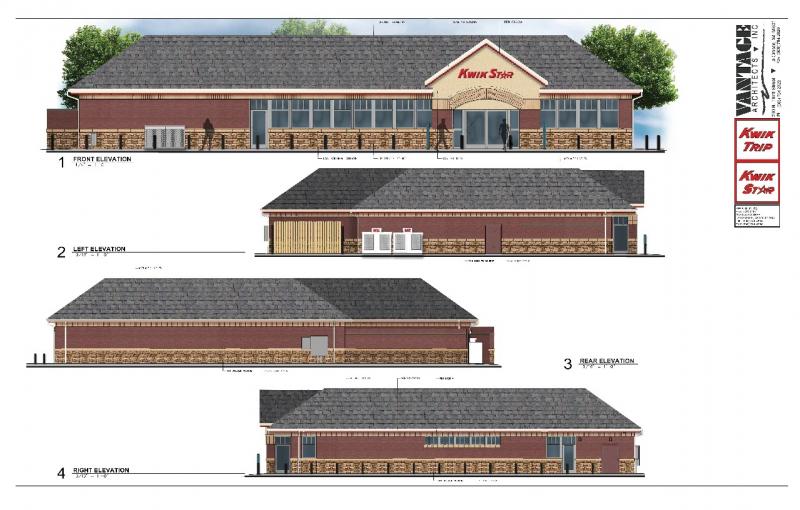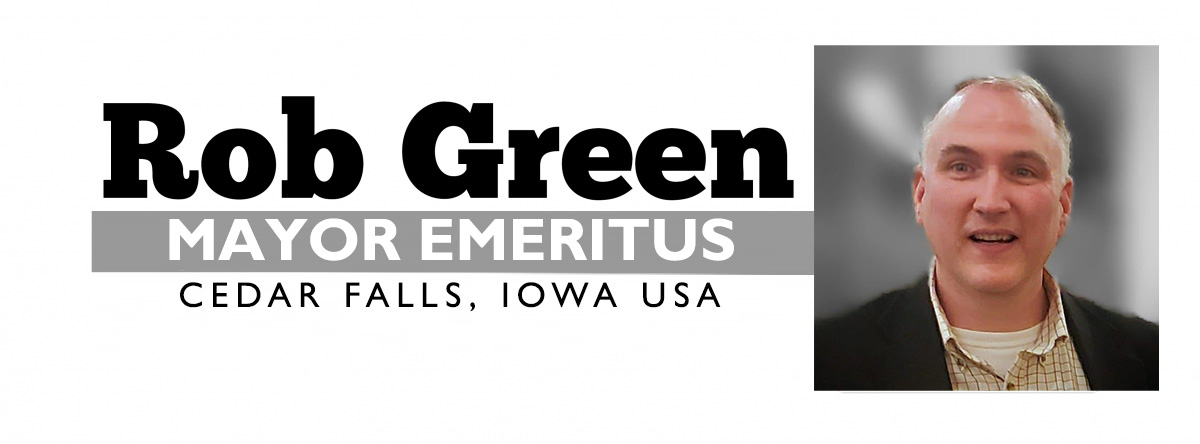
I’ve been asked by several residents to describe how Kwik Star came back up for a vote, and my rationale for voting “no” the second time. I could simply reply to their e-mails, but decided it was worth a blog post for the public record. As your At-Large rep, I have a responsibility to you to be accountable for my decisions, and in the past you've expressed your appreciation for my explaining my thinking (though I know that's not terribly common in government). In the interest of 'lessons learned' and transparency, here's my description of the reconsideration.
Our first consideration of the Kwik Star site plan occurred on Monday, February 19, 2018. My "no" vote on Kwik Star (and for that matter, Fareway) resulted from my belief that both Fareway and Kwik Star would exacerbate an already dangerous traffic situation from the northbound South Main approach to Greenhill Road. I saw traffic backups during my campaign visits to El Dorado Heights neighborhood in August 2017, and read similar concerns from residents in opposition to these two projects in February 2018. So I believed that the timing of these two projects would needlessly cause a dangerous traffic situation on the South Main northbound approach to Greenhill, and that council had the authority to deny under our duty to protect the health, safety and welfare of residents.
As I was the lone “no” vote on Fareway, I was compelled to re-evaluate the traffic situation in late February, to see why I had such a different view on traffic than city staff, the traffic study researchers, Planning and Zoning, and the rest of City Council. To my great surprise, over several days I didn't see the kind of northbound traffic snarls on Greenhill and Main that I’d noticed during my two visits there in August 2017. It was a very different dynamic than my previous impression of that area. I also met for an hour and a half with Jon Reisler (our city engineer), Mayor Brown and Administrator Gaines, to go over in detail the intersection traffic study, general questions about traffic flow, and the city’s plans for that intersection. We went into much greater detail than they typically do with council members, and I asked a lot of questions, which they were able to answer to my satisfaction. For example, I had thought it was a pretty big oversight that the study didn’t count cars coming out of Balboa and Cordoba onto South Main...only Bluebell and Greenhill. But those cars DO get counted as part of the flow past Greenhill from Main, so they really are accounted for. That meeting with Mr. Reisler gave me a much better appreciation for that intersection and its challenges.
I volunteered to the mayor that the presentation and my own observations had alleviated my concerns about the imminent safety hazards of that intersection. Because Section 2-102 of the city code allows a motion to be reconsidered only the first meeting after the vote was taken, I believed I would be dishonest if I failed to allow for a reconsideration, given the new information I’d received. Councilor Wieland, who had also voted “no”, expressed separately to the mayor a willingness to reconsider, or his own reasons. Section 102 required both a motion and a second from the prevailing side, so that’s how it was allowed to come back up for a reconsideration. That motion came up on March 5th, and we voted to table the reconsideration until our April 2nd council meeting, to allow time to advertise a new public hearing.
Importantly, the Waterloo-Cedar Falls Courier inaccurately reported that two council members had “changed their minds” about Kwik Star. That simply wasn’t true in my case -- I had new information which had compelled me to reconsider, but I certainly wasn’t in the “yes” camp. I simply needed time to reevaluate the whole site plan from scratch. Because we were advised not to engage publicly on Kwik Star outside of a public hearing, that impression stood up until April 2nd, which was unfortunate.
During the interval between our February 19th meeting and our April 2nd meeting, I studied the zoning ordinances in great detail; our ex parte guidance meant I couldn’t engage with residents, developers, or others about the project, but I did have a wealth of material available to review -- including the Planning & Zoning commission packets and videos, council packets and videos, and the ordinances themselves. And the April 2nd council packet provided me me with updates and new information and perspectives for understanding all sides of this site plan.
All of this information led me to question how the Kwik Star site plan fit into our concept of “neighborhood commercial” in the Mixed-Use Residential Zoning District. The Mixed-Use Residential District ordinance states that a commercial use is permitted if it can be generally characterized as “neighborhood commercial” or is intended to serve the surrounding residential areas. With its 24 hour operation, ability to fuel 20 vehicles, two-stall car wash, and a store twice the size of others in our city’s “neighborhood commercial” zones, I questioned whether the scale of that Kwik Star exceeded intent of the Mixed Use Residential District Zoning Ordinance. That was the basis for the graphic I provided at the April 2nd meeting.
At the end of the hearing, I’d had enough information to determine that the scale of the Kwik Star was in fact excessive for the MU Residential District, and thereby did not comply with the zoning ordinance. Sadly, I was unable to persuade the rest of City Council to share that view.
Although I was very disappointed in the outcome of that vote, I stand by bringing it up for reconsideration; at the time, I did not yet have the understanding of the Mixed Use Residential District that I do now. Hindsight being what it is, I wish I had developed that insight before the March 5th meeting, and this experience has given me a strong drive to dive into our zoning ordinances -- to seek an expert understanding and wise interpretation of them well before another controversial vote comes up. Because now I see the perils of not doing the hard work early on.
My three main takeaways from the Kwik Star reconsideration:
-
I believe our zoning ordinances need to more accurately define the scale of permitted uses in the MU and in C-1. I will press to see that happen as we update our zoning ordinances -- whether it’s by distinguishing between a “filling station” and a “travel plaza”, by placing caps on the number of pumps or hours of operation, or some other consideration. Clarification of commercial uses in our ordinances will serve to protect residents from overambitious developers, while at the same time preserving the rights of zoning-compliant developers. If you agree, please communicate that to your Ward representative, and my At-Large colleague.
-
We need an enforceable policy on ex parte communications in line with other Iowa cities for quasi-judicial decisions. As I understand it, our current guidance is more restrictive than that of other cities. The policy we create needs to reflect the responsibility of elected officials to engage with the residents they’re accountable to. And this policy needs to be readily available to the public (perhaps through training during Committee of the Whole) so that all stakeholders are on the same page.
-
During this whole process -- and so early on in my council term -- I was very impressed by the civility, thoughtfulness, and reasonableness of the residents who wrote in to me, as well as to the professional courtesy shown to me by the Mayor, City Administrator, city staff, and the rest of City Council in this complex and controversial decision. I was never pressured to vote one way or another, and was invariably treated with respect by everyone involved in this process. I greatly appreciate that, because respect (or more precisely, comity) is the binding that allows meaningful dialogue and new understanding to take place. So thank you for that.
Though disappointed in the outcome, I'm more appreciative of the vital role of informed and engaged residents in city council deliberations...and in the role that City Councilors can (and should) play in setting the tone and vision for our city’s decision-making. I hope this post gives you a better sense of my thought process, and will encourage you remain informed and engaged in the municipal decision-making processes of Cedar Falls.
